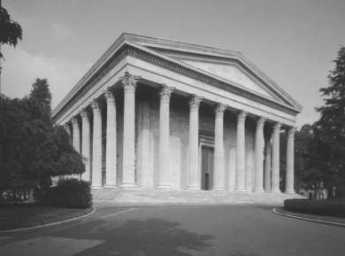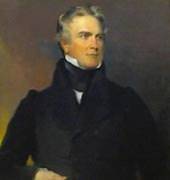Related Topics
Religious Philadelphia
William Penn wanted a colony with religious freedom. A considerable number, if not the majority, of American religious denominations were founded in this city. The main misconception about religious Philadelphia is that it is Quaker-dominated. But the broader misconception is that it is not Quaker-dominated.
Quakers: The Society of Friends
According to an old Quaker joke, the Holy Trinity consists of the fatherhood of God, the brotherhood of man, and the neighborhood of Philadelphia.
Particular Sights to See:Center City
Taxi drivers tell tourists that Center City is a "shining city on a hill". During the Industrial Era, the city almost urbanized out to the county line, and then retreated. Right now, the urban center is surrounded by a semi-deserted ring of former factories.
Academia in the Philadelphia Region
Higher education is a source of pride, progress, and aggravation.
Touring Philadelphia's Western Regions
Philadelpia County had two hundred farms in 1950, but is now thickly settled in all directions. Western regions along the Schuylkill are still spread out somewhat; with many historic estates.
Education in Philadelphia
Taxes are too high, but the tax base is too small, so public education is underfunded. Drug use and lack of classroom discipline are also problems. Business and employed persons have fled the city, must be induced to return. Deteriorating education, rising taxes and crime are the immediate problems, but the underlying issue is lack of vigor and engagement by the urban population itself.
Religion at Girard College:Spiritual But Irreligious
According to Cheesman A. Herrick, "After Girard had dictated that famous section of his will excluding clergymen and William J. Duane had written it down, Girard asked Duane what he thought of it. Duane, being quite unprepared for the question, and somewhat at a loss to interpret the section, answered, ' I can only say now, Mr. Girard, that it will make a great sensation.' To this Girard replied, ' I can tell you something else it will do -- it will please the Quakers.'"
 |
| Stephen Girard College Founders Hall |
In the Western part of America, Quaker meetings sometimes do have paid ministers, but the Philadelphia Yearly Meeting and it is component monthly meetings have held steadfastly to the tradition of "unprogrammed meetings"-- without ministers. Girard was not a Quaker, but he greatly admired them, and three of the five executors of his will were Quakers. It, therefore, seems likely, at a minimum, he hoped that Quaker sentiment would fortify his intended banishment of clergymen from his school for orphans, and he might well have got the basic idea from them. Quakers have long noted with disapproval that paid ministers have often publicly supported wars, and Quakers notice that governments waging wars have typically sought to stir up warlike feeling by persuading ministers to help them do so. Another behavior which is almost inherent in the clergy is for ministers to feel that they are measured by the size of the congregation they attract, and hence almost invariably proselytize for new membership. Girard had firm ideas about influencing impressionable orphans, and he did not wish to have outside ideologies capture the administration of the school. 1830 was an evangelical time, and Girard could easily imagine some highly charismatic minister captivating the school.
Other motives may, of course, be imagined. This is what is actually in the will:
Prohibiting any ecclesiastic, missionary or minister of any sect from holding or exercising any station, no such person should ever "be admitted for any purpose or as a visitor, within the premises occupied by the College...I do not mean to cast any reflection upon any sect or person whatsoever, but inasmuch as there are such a multitude of sects, and such a diversity of opinion amongst them, I desire to keep the tender minds of the orphans free from the excitements which clashing doctrines and sectarian controversy are so apt to produce." As matters were to turn out, religious meetings have been conducted by laymen almost every day at the College, and the custom grew up that the boys themselves were often called upon to conduct religious meetings. A great many graduates of Girard College eventually went on to careers in religious ministry, so it even seems likely that their experience at the school had the effect of interesting them in the ministry by giving them a taste of it.
In 1844, the numerous relatives of Stephen Girard tried to break the will. No one has seriously proposed their grievance was anything but financial. However, they sought the services of the most noted lawyer, orator, and statesman of his day, Daniel Webster. Webster would have been wise to refuse to take the case since he could think of no better argument to use than that -- the exclusion of ministers demonstrated the school for orphans was not a true charity, and only a true charity would be allowed to exclude ministers. Several days of oratory enveloped this preposterous argument, which today reads like pure bombast and humbug. The U.S. Supreme Court in time unanimously rejected his brief, with the generous comment that the law was not on his side. Other lawyers have privately remarked that such oratory was never intended to persuade a court, but to impress a rich client.
 |
| Horace Binney |
Horace Binney, the lawyer son of another Horace Binney who established an enduring reputation for calmness in midst of a religious storm during the Hogan Schism, was the successful defender of Girard College. In contrast with the flowery reverberations of Webster's voice, Binney confined himself to short words in short sentences, sticking strictly to the point without appeal to emotion. In fact, one wonders why Webster stooped to it. Historians credit him for the arguments that later inspired the defenders of the Union with enough conviction to win the Civil War. Essentially, he convinced Unionists that the Constitution had not created a confederacy, but a Union, which implicitly must have all the powers needed to preserve itself. Half the nation would not accept his reasoning, however, and his willingness to proclaim nonsense in the Girard case confirmed many Southern suspicions that the Union argument was also specious. Fifteen years later, Philadelphia was quite slow in coming to the Union side, for a variety of reasons. His attacking a cherished Quaker belief in a Quaker city was certainly not useful. In time, it would be possible to hear a quiet parody of the Union's marching song, that "He died to make men holy -- we will kill to make men free."
 |
| Advice to Young Men and Boys |
It is unfortunate that the one thing most people think they know about Girard College is that religion is excluded. Far from it, there is more attention to morals and ethics than in public schools. Indeed, Girard College compares well with Phillips Exeter Academy, Webster's prep school and perhaps his model. One of the great concerns about orphans is that they may be easily led into a life of crime; there is no doubt that Girard College makes unusual efforts to keep that from happening. In fact, the school may be said to have written its own prayer book during the late 19th Century. Books of devotion were written and then organized by committees of laymen, eventually published by the Chairman, Benjamin B. Comegys. Entitled Advice to Young Men and Boys", Comegys notes that the book was published "in the hope that it may be the means of helping some boys and young men other than those to whom the Addresses were made." It would have to be observed that Girard College inspired an unusual interest in the ministry among the boys, by encouraging them to lead in the ceremonies themselves. And by having the Board of Trustees participate in the construction of books of moral principles, they no doubt similarly evoke a high sense of fidelity within the businessmen trustees. Since those entrusted with huge amounts of money are faced with huge temptations, the Trustees quite possibly need the stimulus as much as the students do.
REFERENCES
| Girard College It's Semi Centennial of Girard College: George P. Rupp ASIN: B000TNER1G | Amazon |
Originally published: Tuesday, June 20, 2006; most-recently modified: Monday, June 03, 2019
| Posted by: Carlyle Smith | Mar 1, 2017 11:20 PM |
| Posted by: brian ruth | Jun 7, 2012 9:25 AM |
| Posted by: Ronald Lyall | Jun 11, 2009 10:06 AM |
| Posted by: Elizabeth Liddell | Nov 7, 2007 8:26 PM |
I am a regular participant on the reputable conservative, constitutionalist "Free Republic" (FR) web forum (a link to this site will come up immediately with any search engine).
The purpose of this note is to submit a request to republish part or all of your "musing" on the Girard College's view and relationship to religion as it has been addressed in the Girard Will and on the College campus.
I think that this will be a very interesting way to attract attention to your thoughts on one aspect of Stephen Girard's philanthropy to our nation, residing in his dedication to American Freedom. Note that Free Republic has a reasonable high rating on the Alexa distribution statistic, so presenting your thought would be to a typically global audience.
If you would permit, I would be very grateful to have permission to select at least a 300 word or less excerpt, but would be pleased to be able to put the entire text as one article for Free Republic (FR), giving you full credit as the source.
Since the style of FR posts is restricted to elementary HTML, the body of your text would appear with the paragraph structure as in your attractive presentation, but would be limited to ANSI-compatible or Unicode typeface, nominally Times-Roman, probably 12-point. The abstract would actually link to your actual web site, so that the reader could examine the native elegant presentation in situ. May I have your permission for presenting this article to the Free Republic forum General Discussion?
Thank you for considering this request.
Carlyle F. Smith, B. S., M. S., Ph. D.
Senior Research Scientist, the Dupont Company, Retired
Wilmington, DE
March 1, 2017